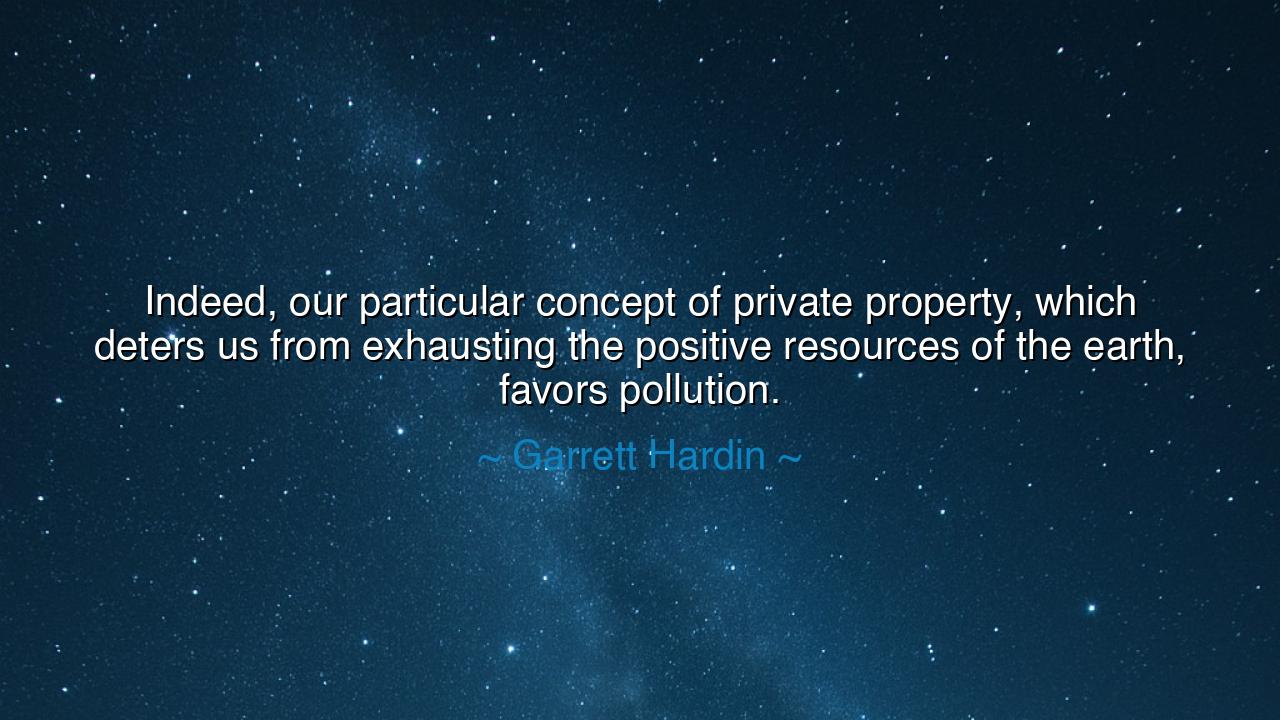
Indeed, our particular concept of private property, which deters
Indeed, our particular concept of private property, which deters us from exhausting the positive resources of the earth, favors pollution.






The words of Garrett Hardin, “Indeed, our particular concept of private property, which deters us from exhausting the positive resources of the earth, favors pollution,” strike like a stern warning from one who has studied the fate of civilizations. He reminds us that the very laws and systems we build to protect wealth may, in their twisted form, unleash destruction. The doctrine of private property, intended to safeguard stewardship, often blinds its holders to the wider responsibility owed to the common world. Thus, the rivers, skies, and forests, which belong to all, are left vulnerable to the poisons of neglect.
The origin of this thought is bound to Hardin’s famous meditation on “the tragedy of the commons.” In times past, fields, streams, and pastures were shared by all, and so all bore the duty to preserve them. Yet as societies hardened their rules of ownership, what could be held and claimed was guarded fiercely, while what lay beyond—air, oceans, atmosphere—was left untended. It is this imbalance that Hardin warns against: that the positive resources of the earth are depleted not by malice alone, but by systems that favor short gain over lasting balance.
Consider the story of the Industrial Revolution, when factories, built upon the principle of private profit, spewed soot and waste into the skies and rivers. The mill owner protected his machines, his goods, and his land, for these were his property. Yet the smoke that blackened lungs, the chemicals that poisoned waters, were cast upon the commons—upon the air and rivers that belonged to none and so were guarded by no one. Here is Hardin’s truth made flesh: pollution thrives where ownership ends, and the collective treasures of humanity are treated as expendable.
His words remind us that a narrow defense of property blinds us to the greater inheritance of the human race. The mountains, seas, and winds are not possessions to be claimed, but trusts to be honored. When law and greed exalt ownership above stewardship, the earth itself becomes the victim, and the children of tomorrow inherit ash instead of abundance.
The lesson, therefore, is both urgent and timeless: the guardianship of the earth must not rest in the hands of profit alone. We must extend our sense of responsibility beyond what we hold in deeds and titles, to the air we breathe, the waters we drink, and the soil that feeds us all. True wealth is not measured in boundaries drawn on parchment, but in the health of creation itself.
Let the generations remember: the positive resources of the earth are not infinite, nor are they the birthright of the few. They belong to all, and to the unborn as much as to the living. To protect them is not charity, but duty; to neglect them is not freedom, but folly. For if we fail, the smoke of our arrogance will rise where once stood forests, and the silence of poisoned rivers will testify against us.






HTDinh Ha Huyen Trang
Hardin’s quote highlights a critical issue: the tension between private ownership and the collective good, particularly in terms of environmental protection. The idea that private property can encourage pollution seems counterintuitive to many, but it makes sense when we consider how landowners often prioritize short-term profits over the long-term health of the planet. Could altering our economic and legal systems help shift this dynamic? Are there examples of communities successfully managing resources without relying on traditional private ownership?
ZMZinhh Meimei
This quote makes me think about the deeper consequences of private property ownership in the context of environmental sustainability. While private ownership has long been a cornerstone of capitalist economies, its relationship with resource depletion and pollution is undeniable. How do we change the mindset that prioritizes ownership and consumption over conservation? Would introducing collective ownership models help, or would it just complicate the issue further?
HDHaa Dayy
Hardin’s perspective challenges us to think about how our values around private property might be contributing to environmental degradation. In a world where profit-driven motives dominate, how do we incentivize responsible resource use? What role does government regulation play in changing attitudes toward property ownership and environmental responsibility? Can a shift in ownership models help combat the pollution and overuse of the earth’s resources?
HDNguyen Hoang Duy
I agree with the essence of Hardin’s quote, especially in relation to how private property ownership can lead to unsustainable practices. When people are solely concerned with maximizing profit from their land, the environment often suffers. How can we balance individual property rights with the need for global environmental protection? Can policies or regulations be created that incentivize owners to care for resources sustainably instead of exploiting them?
NMngoc mai
This quote is an interesting critique of private property. Hardin suggests that when individuals own resources, they may not feel the need to conserve them, leading to overuse and pollution. But how do we shift away from the idea of private ownership while still respecting personal rights? Is there a model of shared or communal ownership that could prevent overexploitation of resources while still promoting innovation and growth?